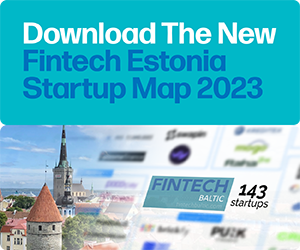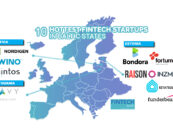
Lithuania New 2023-2028 Fintech Strategy Puts Emphasis on Quality
by Fintechnews Baltic November 10, 2023Lithuania’s new 2023-2028 fintech strategy is putting a focus on attracting fintech leaders and supporting the qualitative development of the Lithuanian fintech sector in a bid to become a leading European fintech hub and center of excellence.
Released on October 23, the Guidelines for the Development of the Lithuanian Fintech Sector for 2023-2028 formulate directions and areas of focus for the development of the fintech sector in Lithuania within the next five years.

The Ministry of Finance, together with partners, prepared the Guidelines for the Development of the Lithuanian Fintech Sector for 2023-2028, Source: Lithuania’s Ministry of Finance, Oct 2023
The strategy sets out ambitious goals including an annual sector turnover growth rate of 30% and 35 million customers spread out across companies licensed in Lithuania by 2028.
It also aims to have 70% of fintech companies in the country maintain a workforce of at least 10 full-time employees, and have at least eight foreign fintech companies establishing a presence in Lithuania and committing to creating over 50 jobs within three years of establishment.

Lithuania’s fintech goals for 2028, Source: Lithuania 2023-2028 Fintech Strategy, The Ministry of Finance of Lithuania, Oct 2023
New fintech initiatives
The guidelines provide a comprehensive approach to reaching these goals. Attracting and retaining international fintech companies is seen as a top priority, with the Bank of Lithuania’s Newcomer Programme viewed as paramount in achieving this.
Launched in 2016, the program is designed to introduce potential financial market participants including startups and fintech companies to the conditions for operating in Lithuania. Since its inception, it has had participants from 78 countries, with the number of fintech companies taking part increasing from 94 to 179 over the past 12 months.

Lithuania’s Newcomer Programme, Source: Bank of Lithuania
A lot of attention is also being put on the prevention of money laundering and terrorist financing, financial crime and fraud, information and communications technology (ICT) security, and the protection of consumer interests.
In addition to these measures, the guidelines share several steps to ensure talent supply for Lithuania’s fintech sector. These include strengthening cooperation between participants in the fintech ecosystem with higher educational institutions, applying financial incentives to attract ICT talents, and easing of relocation requirements for ICT professionals specialising in high value-added sectors from third countries.
On the regulatory front, the Ministry of Finance is planning to develop a model for regular cooperation between the public and private sectors, so that both the fintech ecosystem and the public sector can share their expertise in finding solutions to existing problems.
In addition, the Bank of Lithuania will be examining the possibility of applying the regulatory sandbox to already licensed fintech companies planning to expand their activities. This would increase the attractiveness of the sandbox regime. The central bank will also be reviewing the necessary procedures to ensure that the extension of the operating licence in the field of financial services is as effective as possible.
Other initiatives under the plan to look forward to include the establishment of the Innovation Lab; the introduction of financial incentives for startups to develop products and solutions for artificial intelligence (AI), blockchain technology and robotics processes; and the expansion of the country’s payment infrastructure solutions.
Lithuania’s fintech sector
Over the past years, Lithuania has seen the emergence of a burgeoning fintech ecosystem.
The Fintech Landscape in Lithuania 2022-23 Report, published in March by the country’s agency for foreign direct investment and business development, Invest Lithuania, reveals that more than 260 fintech companies were domiciled in Lithuania at the end of 2022. These companies employed 7,000 people, a 19% increase from the year prior, and served over 25 million Europeans at the time.
In H1 2022, revenue generated by licensed electronic money and payment institutions in the country reached a new record of EUR 375 million, up 80% year-on-year (YoY), data from the region show. Compared with H1 2018, the sum represents a 26-fold increase, a growth that was manly driven by larger and more established fintech companies.
This growth has been driven by efforts from the government to foster the development of the sector by, notably, establishing an appealing regulatory framework. In Lithuania, a fintech company can get up and running with an electronic banking license in as little as three months, compared with a European average of 12 months. The application process can be done entirely online.
Featured image credit: Edited from freepik







No Comments so far
Jump into a conversationNo Comments Yet!
You can be the one to start a conversation.